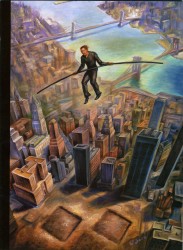Interesting discussions (here and here) over at Mother Jones regarding films depicting historical events. Just how much liberty with the historical facts will viewers tolerate? Or does anyone care?
There are a few historical films out now. Valkyrie for one. Frost/Nixon for another. And Milk.
Frost/Nixon is Ron Howard's third historically-based film, having done Apollo 13 and A Beautiful Mind. I knew there were some inaccuracies in Apollo 13. Things were condensed, and situations made more "dramatic" than they were. I didn't mind it too much: I think a little dramatic license is necessary to create, well, drama. And I wasn't troubled by the liberties taken in A Beautiful Mind, because I knew nothing of the story beforehand. As for Frost/Nixon, I haven't seen it (I'm seeing the national tour of the play next month), but I suspect it won't stray too far from the truth.
Being a Titanic buff and a JFK assassination buff, I was trepidatious about Titanic and Oliver Stone's JFK. I was pleasantly surprised by Titanic. Obviously, the DiCaprio-Winslet characters were fictional, as was their story. But the facts of the Titanic — its structure, sinking, etc. — were fairly accurate, with the notable exception of Murdock (a real person) wielding a gun at the masses of panicking people, shooting one, and then killing himself. There were rumors of that happening, but that was largely debunked decades ago.
JFK was problematic for me because it was a conspiracy film. It's hard to say whether a conspiracy, unsolved today, can be deemed "accurate" when depicted on film. The main problem with JFK for me, however, was that it tried to touch on various aspects of all the conspiracies, and of course, many of the conspiracies themselves are contradictory. I mean, they simply can't all be true.

From The New Yorker on the
5th anniversary of 9/11 More problematic for me is a little-known but excellent film called Man On Wire, which came out this year and won the Sundance Jury Prize for Best Documentary. One of my favorite films of the tear — check it out if you get the opportunity. The film chronicles the incredible feat of Philippe Petit, the Frenchman who, in 1974, rigged a wire between the two WTC towers and spent 45 minutes walking between them in a highly illegal act that become beloved by New Yorkers. Without narration, the film merely relies on interviews of the players involved, including Petit, his girlfriend, and co-conspirators.
I saw Man On Wire in the theater; I now have the DVD. And in the DVD extras, there is an interview with Petit apparently conducted after the film was put together. In one part, he criticizes the film for depicting him as abandoning his girlfriend and close friends shortly after his successful stunt and instant fame and notoriety. I'm not sure the film really says that, although one could certainly get that implication, I suppose.
But here now, we're talking about a documentary. An award-winning documentary at that. And the issue of there being dramatic license taken by a filmmaker there – in a documentary – well, that doesn't quite seem that right to me.
On the other hand, since this movie relies on past recollections by the participants in the "crime", perhaps the "historical truth" is gray and subjective. And the documentary is not "wrong" in presenting subjective viewpoints. After all, Petit was not the only one on the inside at the time, and his post-film griping might be a reflection of his subjective view of history, rather than the objective truth. Perhaps, about some things, there is no objective truth.
Still, I do have some concern that people may see some of these "historical" films and that becomes the "new" history of events that happened, despite the fact that many of these films give the disclaimer that "dramatic events have been added, characters have been composited, etc." I wonder if that's a good thing when historical drama creates such misinformation.

